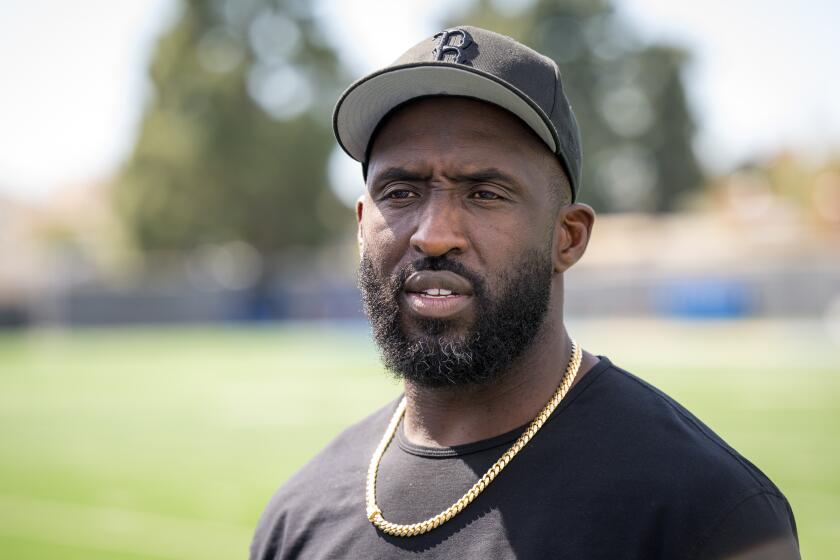Step by Step, UCLA’s Ogden Takes on Best Pass Rushers
- Share via
One bad step in one of 85 plays seemed to cast a shadow over an entire afternoon’s effort.
On UCLA’s first offensive play of the second half at Washington State on Saturday, Jonathan Ogden stepped toward the center with his right foot, instead of stepping straight back, and opened the way for DeWayne Patterson to draw a bead on Bruin quarterback Rob Walker’s ribs.
“It wasn’t like Jonathan whiffed,” Coach Terry Donahue says. “He just didn’t get enough of Patterson.”
Patterson got plenty of Walker, though, slamming him, stripping the ball and starting a 20-minute span in which he had two sacks, a fumble recovery, knocked down two passes and intercepted another, returning it 89 yards for a touchdown.
One misstep. But that is one more than a left tackle is allowed. He is in charge of protecting a quarterback’s blind side.
“I might get upset after the game,” Ogden says. “But you don’t have time to get frustrated and upset in a game because if you do get that way, it’s just going to get worse.”
One misstep. Ask any offensive lineman and he will tell you “skill position” is a misnomer. It is applied to offensive and defensive backs and receivers. But, Ogden says, “You have to have skill to play anywhere on the field.”
Says Donahue, a former defensive lineman: “Every position is a skill position.”
“There’s a lot of technique involved, especially when you prepare for certain players,” Ogden says. “Some of them will ‘swim,’ and some will try to go underneath you. You have to watch film on each individual player you’re going to play each week to see what he likes to do and what he does best.”
Then you have to hope he hasn’t learned any new steps in the last week.
“What being left tackle really means is playing the opposition’s best pass rusher on my side, in most cases,” Ogden says. “It just means I have to be that much better prepared, because I’m going against (Arizona’s Tedy) Bruschi one week, then the next week DeWayne Patterson, and this week (Arizona’s) Shante Carver and next week (USC’s) Willie McGinest. It’s rough.”
It’s a murderers’ row of pass rushers, all holding or nearing school records for sacks.
Ogden uses size to counter their quickness and strength. He gets his 6 feet 8 inches and 310 pounds in motion quickly, with a cat-like first step, but don’t ask for much more. Among the slowest of the Bruins in a straight-line run, he has a burst to carry him into a defensive end or to pull to cut off a nose guard, and size to do something when he gets there.
It’s a job he showed he could handle quickly, gaining second-string status before his first game as a freshman and starting by his sixth.
Preparation was done at St. Alban’s High in Washington, D.C., where the opposition had the names of congressmen and classmates included a Rockefeller and a Marriott. Half of the 69 members of the class of ’91 at St. Alban’s went to Ivy League schools. The step from a Washington prep school to the Pacific 10 seemed huge, but Ogden was undaunted.
“Everybody told me I was good, the college recruiters and all, so I assumed I was and stepped up my game to do it,” he says. “I wasn’t afraid and I didn’t doubt myself.”
Size had something to do with it. He has never been in a situation in which he wasn’t the biggest kid in class. But size isn’t enough. There are many 300-pounders in college football.
The quick step came from basketball, which Ogden played in pickup and AAU games. He always guarded somebody smaller.
The strength came in part from track and field. The trip from St. Alban’s to UCLA was longer there. He has thrown a 16-pound shot 58 feet 11 1/2 inches, and a discus more than 170 feet. But his perspective has changed.
“Last year, I had the 18th or 19th longest shotput in the country,” he says. “I was fifth on my team.”
Motivation also came from track. UCLA coaches had cut a deal with Ogden: make first or second string and you can go out for track and skip spring football. For a young man who respects the seasons, it was motivation enough.
“I think if I played football year-around, I’d get tired of it,” he says. “Just like if I practiced track and field year-around, I’d get tired of that. I’d be better at it, but I’d be tired.”
More to Read
Go beyond the scoreboard
Get the latest on L.A.'s teams in the daily Sports Report newsletter.
You may occasionally receive promotional content from the Los Angeles Times.






